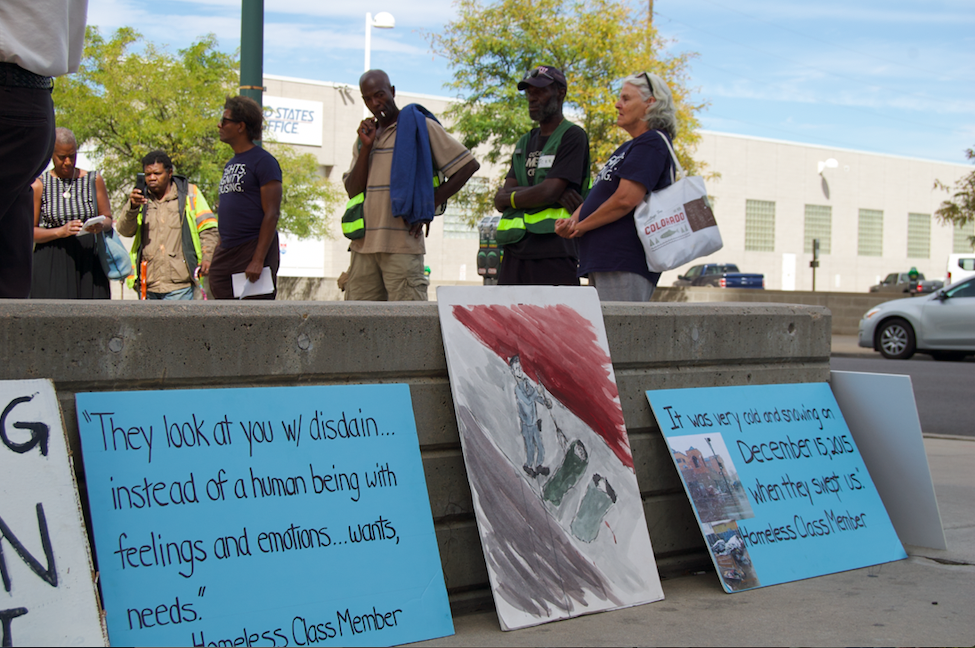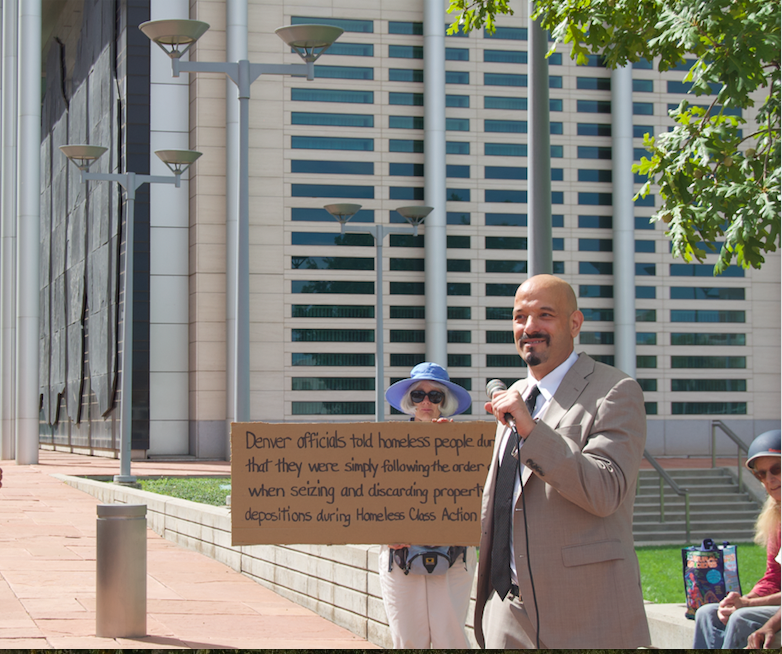
Sara Fleming

Audio By Carbonatix
On Monday, September 23, attorney Jason Flores-Williams displayed his typical dramatic flair. Microphone in hand, he stood before a group of unhoused people and their advocates in front of the federal courthouse, where U.S. District Judge William Martinez was about to approve a landmark settlement between the city and Denver’s homeless population, whom Flores-Williams has been representing in a class-action lawsuit over the past four years. The settlement, Flores-Williams told them, represented “the assertion of the human spirit in the face of a cold and dead world.”
Flores-Williams filed the lawsuit in 2016 after witnessing police harass homeless people. The case focused on the city’s practice of taking people’s property without notice. Before the lawsuit, Flores-Williams explains, Denver Public Works could pick up someone’s sleeping bag and tent on the sidewalk without any previous warning.
“Having the stuff taken from us violates our right to live…and to rest and just sit, when you’re kicking us from spot to spot,” one unhoused person, who said he had his property taken by the city, told Monday’s crowd.
The case almost went to trial last spring, but Flores-Williams and Andy McNulty, a lawyer with Killmer, Lane & Newman, were able to reach a settlement with city attorneys in February.
Both parties agreed that the settlement provides far more for the plaintiff class – anyone who might be at risk of having their property taken – than going to trial likely would have. It spells out a process that the city is to follow before confiscating any property that doesn’t pose a health or safety hazard, including posting a notice seven days before a large-scale cleanup or sweep and individual notices on abandoned property 48 hours before taking it. The settlement also asks the city to provide certain resources that homeless advocates have long been asking for, such as storage lockers, trash cans, portable toilets and needle dispensaries.

Jason Flores-Williams speaks about fighting the homeless class-action lawsuit.
Sara Fleming
The crowd shared Flores-Williams’s excitement, celebrating with cheers when Judge Martinez announced his final approval. “It’s a great day to be unhoused,” said Jerry Burton, a well-known voice in the homeless community.
But advocates also say their work is far from over.
The first thing on Denver Homeless Out Loud organizer Terese Howard’s mind is making sure the city abides by the settlement. During cleanups in the past few weeks around Lawson Park, there has been repeated confusion about what the city can and cannot do under the settlement’s terms.
That’s because the settlement doesn’t change the urban camping ban, so police can still legally tell people on the streets to pack up and move along, and ticket them if they don’t. Sweeps can’t happen quite like they used to – as Martinez defined them in court, the practice of sending ten or more city employees “to clear away an encampment of multiple homeless persons by immediately seizing and discarding the property found there.” But the city can still push people out of any given area at will, which unhoused people say is the more fundamental problem.
“I didn’t choose to become homeless; I became homeless because a forty-hour-per-week job couldn’t pay my rent, it couldn’t feed me, it couldn’t take care of me – because I just didn’t make enough money,” said a person who goes by the name Wolf. “So then I became homeless and I found out that homelessness was a crime. At least they treated me like a criminal.”.
City Attorney Wendy Shea said at the hearing that all departments that make regular contact with homeless people would receive annual training on the new policy, and new employees would go through online training. An additional component of the settlement requires the city to set up a committee of people experiencing homelessness to advise its follow-through practices. Anyone is invited to participate in these meetings, which will be held every three months in a public location. They’ll be professionally facilitated and attended by at least one representative from the mayor’s office and one from the Department of Housing Stability.
The only aspect of the settlement that Martinez disputed was a stipulation about attorney’s fees: The city agreed to pay out about half a million dollars to be split between Flores-Williams and Killmer, Lane & Newman, a portion of which they will then donate to Denver Homeless Out Loud. Martinez said he needed to see more documentation of the work they’ve put into the case before approving it.
Meanwhile, McNulty has also filed a challenge to the constitutionality of the urban camping ban itself. In defense of Burton, who was ticketed this spring for violating the ban, McNulty is arguing that the camping ban violates the Fourteenth Amendment’s equal-protection clause by specifically targeting homeless people. The motion is awaiting a hearing.